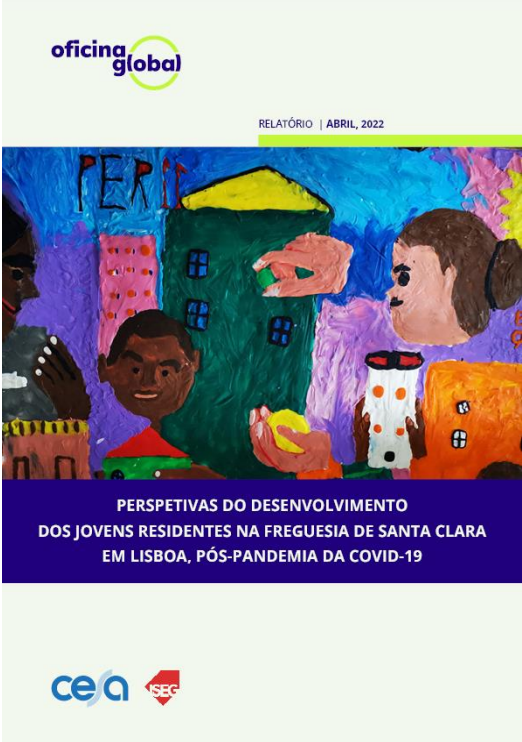Publications
For submission of articles or Working Papers to CEsA, please send an email to:
comunicacao@cesa.iseg.ulisboa.pt
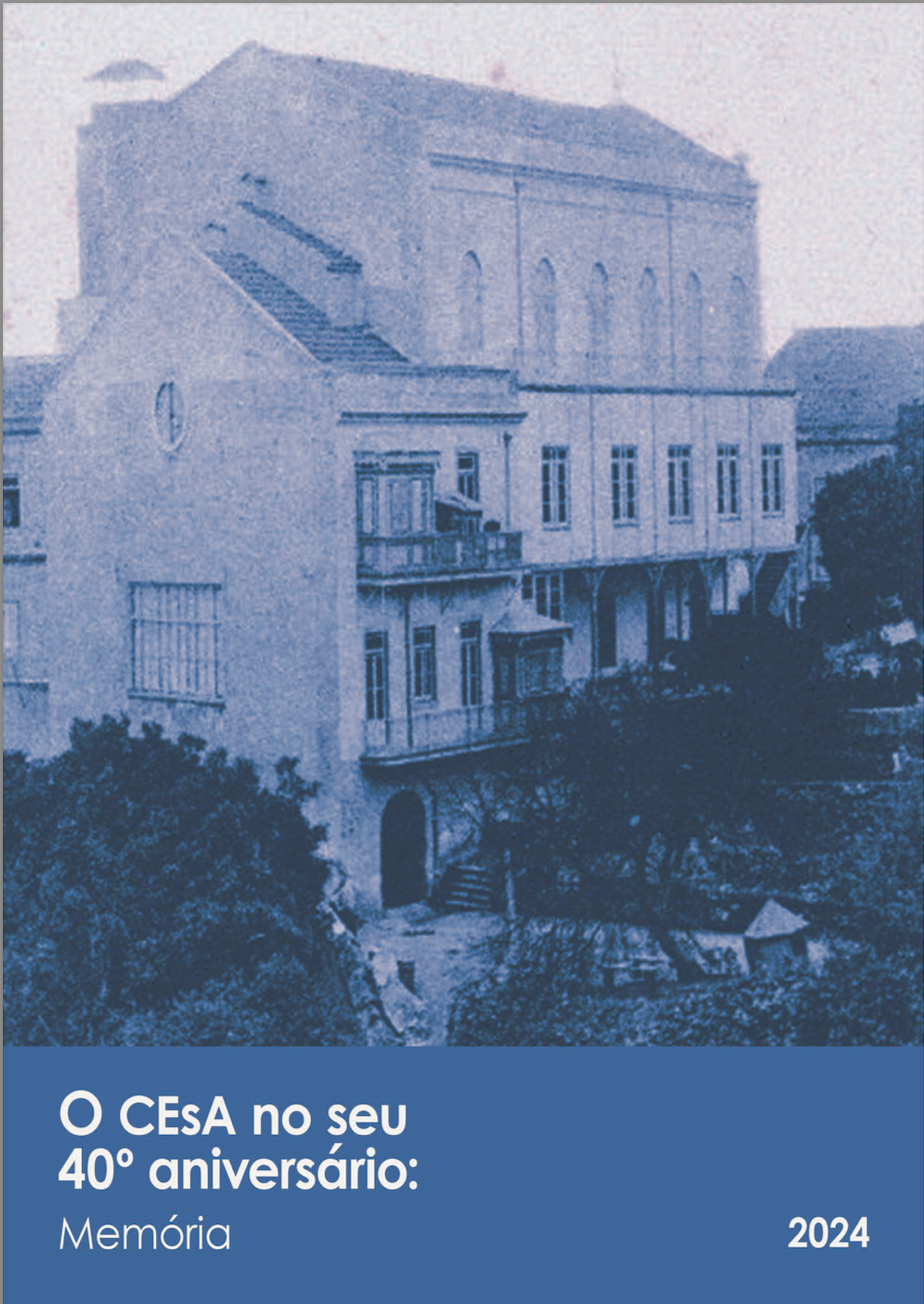
Brochure “O CEsA no seu 40º aniversário: Memória”
Abstract:
The Centre for African and Development Studies (CEsA) of the Lisbon School of Economics and Management, University of Lisbon (ISEG-ULisboa), is a research centre with its own legal personality, founded in 1983 by ISEG faculty members. It currently has two major research lines: 1) Economics, Development, and International Cooperation, and 2) History, Cultures, and Identities. The main funding institution for CEsA is the Foundation for Science and Technology (FCT). Over the years, entities such as the Portugal-Africa Foundation, the Calouste Gulbenkian Foundation, the Camões Institute, I.P., the Caixa Geral de Depósitos, ISEG, the European Union, the UNDP – United Nations Development Programme, among others, have supported various activities and projects. The geographical scope of this activity has mostly been Sub-Saharan Africa with historical ties to Portugal, while not neglecting Asia, particularly East Timor, and Brazil. The celebration of CEsA’s 40th anniversary and the 30th anniversary of the creation of the Master’s in Development and International Cooperation at ISEG offers us a unique opportunity to reflect on the trajectory and legacy in the field of research in Portugal.
Cite this Brochure:
CEsA (2024). “O CEsA no seu 40º Aniversário: Memória”. ISEG/CEsA – Centro de Estudos sobre África e Desenvolvimento.
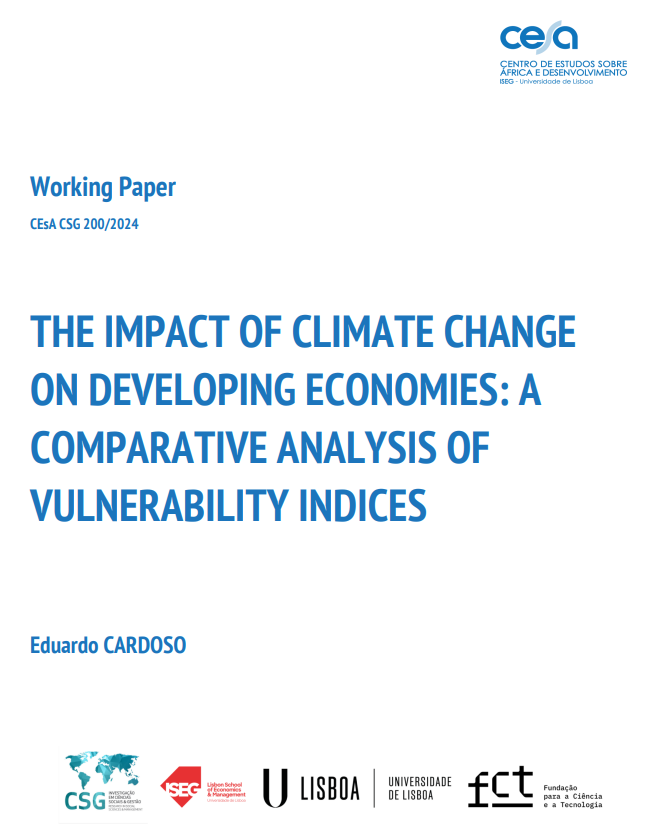
Working Paper 200/2024: The Impact of Climate Change on Developing Economies: A comparative analysis of vulnerability indices
Abstract:
In order to make informed decisions on climate finance and policies, there is an increasing need to develop an index to assess countries’ vulnerability to climate change. However, differing concepts and methodologies have led to varied views on which countries are most vulnerable and deserve more international financial support. This Working Paper examines whether key indices in climate science consistently classify countries’ vulnerability to climate disruption. It begins by reviewing literature on the impact of climate change on developing countries, followed by a comparative analysis of the EVI, ND-GAIN, INFORM, and WRI indices from 2014 to 2020. The findings indicate that while these indices are valuable for understanding and monitoring vulnerability, their differing components lead to divergent results. This research underscores the importance of a holistic approach to vulnerability assessment and calls for informed selection of indices based on specific objectives and contexts.
Cite this Working Paper:
Cardoso, Eduardo (2024). “The Impact of Climate Change on Developing Economies: A comparative analysis of vulnerability indices”. CEsA/CSG – Documentos de Trabalho nº 200/2024.

Disputas de e por Espaços Político-identitários: O rap e os movimentos sociais em Cabo Verde
Abstract:
Independent since 1975 and democratic since 1991, Cabo Verde has not escaped the waves of urban protests that plagued African capitals in the second half of the 2000s. Rap, perceived as the new expression of protest by urban youth, consolidates itself in the 2000s as one of the main actors in the Cape Verdean political scene and becomes an important vehicle for mobilizing and building an urban culture of resistance, amplifying these issues. This article, based on an ethnographic research in the cities of Praia (Santiago Island) and Mindelo (São Vicente Island), seeks to answer three questions: 1) on how rap has shown the identity, social and urban contradictions; 2) how it has articulated with other types of social movements; 3) what is the place of women in rap and street politics?
Cite this paper:
Lima, R.W. and Robalo, A. 2024. 7 – Disputas de e por espaços político-identitários: o rap e os movimentos sociais em Cabo Verde. Africa Development. 48, 3 (May 2024). DOI: https://doi.org/10.57054/ad.v48i3.5321.
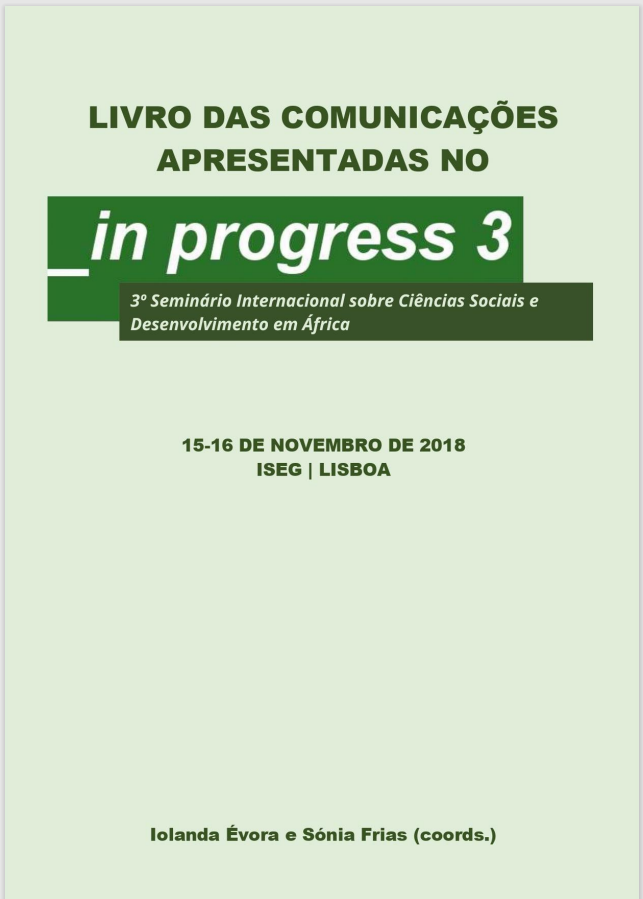
Book of Papers Presented at the In Progress 3 Seminar
Abstract:
This third edition of In Progress, Seminar on Social Sciences and Development in Africa brings together works by researchers and postgraduate students whose study and research theme is contemporary Africa and its development, supported by scientific currents that stimulate new approaches beyond the “development”, exploring the notions of “well-being” or “good living” and remaining close to currents of thought and debates between Africa, Asia and Latin America. The texts include themes such as: fieldwork: practical, theoretical and methodological issues; politics, civil society dynamics, development; culture, thought and change; strategies for cooperation and development; and populations, mobility and well-being. The second part of this work contains the reflections of the speakers invited to the In Progress 3 seminar, which include both a critical perspective on the dominant discourses and methodologies in the field of development policies linked to mobilities, economy and identities, as well as the contribution of financial growth for economic growth and several of the issues to be taken into account in discussions on economic sustainability, taking the example of SADC member countries. The final conference refers to the times and questions that are important to retain and what is important to reflect on in the context of social and human sciences, in particular, when the debate is about the (neo)colonial perspective and contemporary global challenges for African Studies.
Cite this e-book:
Évora, Iolanda e Sónia Frias (coord). 2024. Livro das Comunicações Apresentadas no In Progress 3 com Revisão por Pares : 15 a 16 de Novembro de 2018 no ISEG/ULisboa. Lisboa: ISEG – CEsA
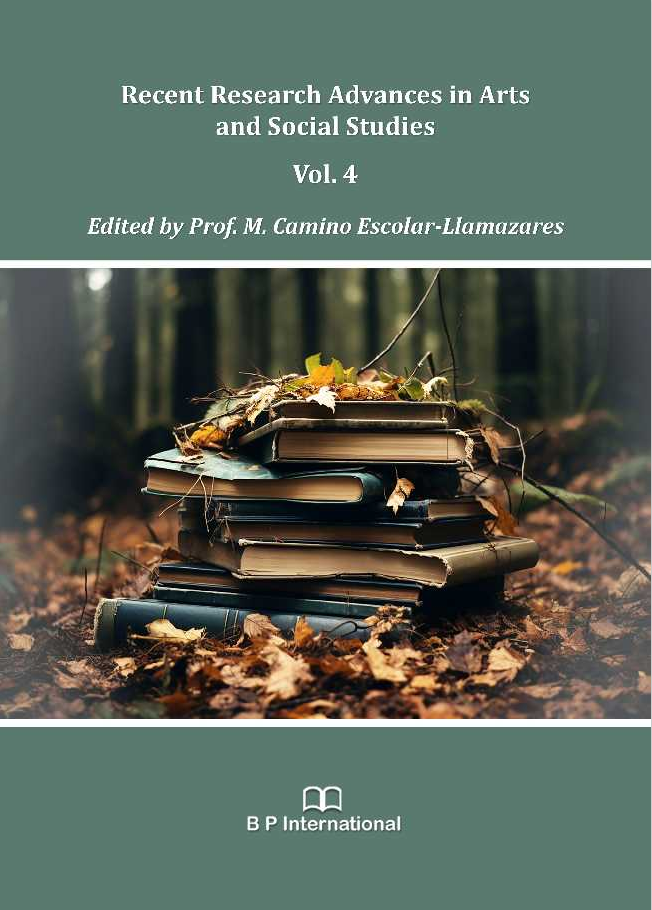
The Values of Portuguese International Development Cooperation: Review and update after 2013
Abstract:
In recent years, International Development Cooperation has assumed particular importance in scientific research and there are currently several studies of general scope or limited to a smaller geographical or thematic space, such as those that focus on national cooperation policies. In general, these works have sought not only to explain its historical, institutional and strategic evolution, but also to constitute a basis for reflection on a long journey of ideas, values and practices that it has been following and its results with partner countries. Portuguese Cooperation is no exception and, in general, all the publications that contextualize it refer directly or indirectly to the general values by which it is governed. However, there aren´t studies that identify the individual reference values of the action of the Cooperation actors in their practice of identifying, managing, and evaluating projects. In this article, we intend to identify the values considered as guiding principles of the action that the actors of the Portuguese Cooperation individually consider in the practices they develop. Such an intention constitutes a real innovation, since the only values identified so far are those that governments include in the strategies presented, more or less inspired by the documents of the European Union (EU) and the Development Assistance Committee (DAC) of the Organization for Economic Co-operation and Development (OECD).
Cite this paper:
Sangreman, Carlos e Raquel Faria (2024). ” The values of Portuguese International Development Cooperation: Review and Update after 2013″. In Recent Research Advances in Arts and Social Studies (Vol. 4), M. Camino Escolar-Llamazares (ed), 148-167. London: B P International
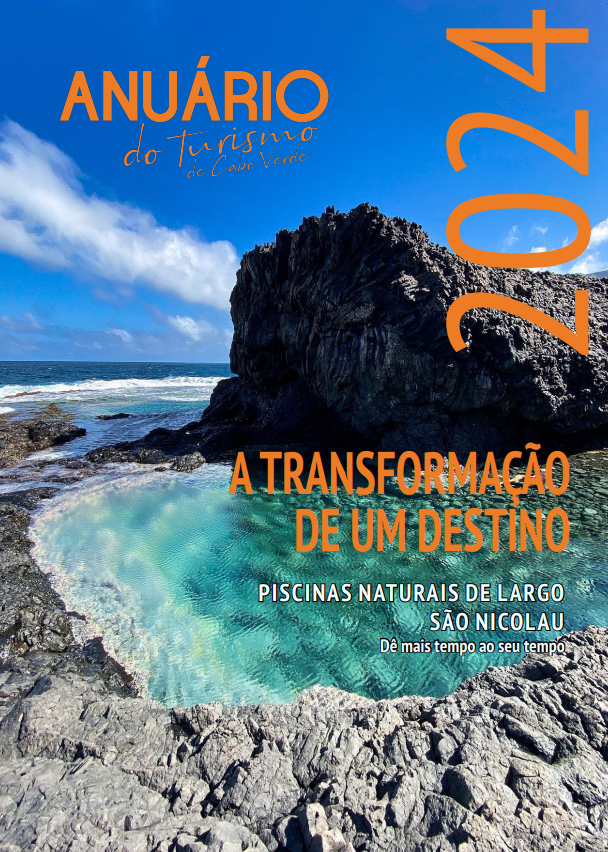
Turismo Costeiro e Marítimo em Cabo Verde. Rumo a um destino sustentável
Cite this paper:
Sarmento, E. (2024). Turismo costeiro e marítimo em Cabo Verde. Rumo a um destino sustentável. In Morgado, Carlos (2024). Anuário do Turismo de Cabo Verde 2024: a transformação de um destino (pp.30-32). Praia, Cabo Verde.
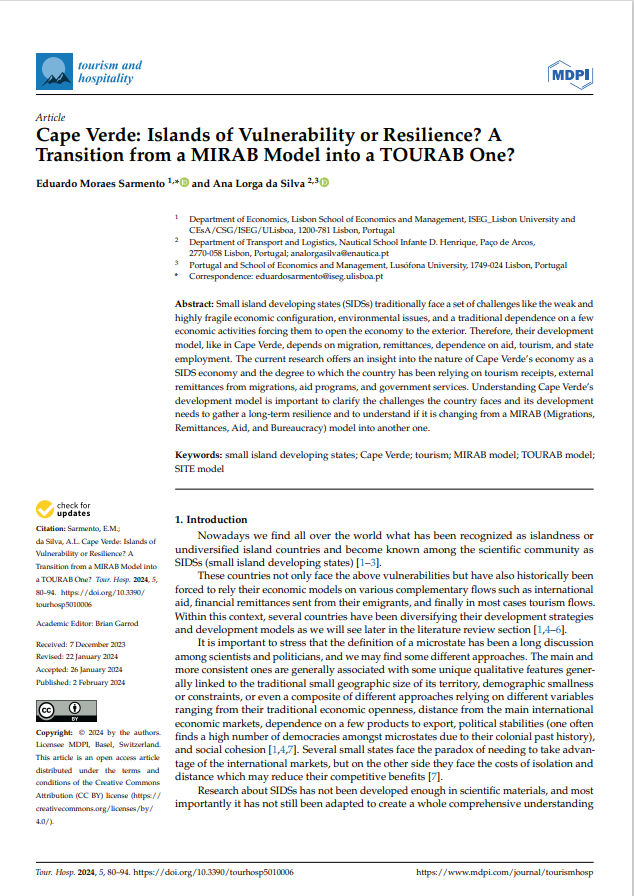
Cape Verde: Islands of vulnerability or resilience? A transition from a MIRAB Model into a TOURAB one?
Abstract:
Small island developing states (SIDSs) traditionally face a set of challenges like the weak and highly fragile economic configuration, environmental issues, and a traditional dependence on a few economic activities forcing them to open the economy to the exterior. Therefore, their development model, like in Cape Verde, depends on migration, remittances, dependence on aid, tourism, and state employment. The current research offers an insight into the nature of Cape Verde’s economy as a SIDS economy and the degree to which the country has been relying on tourism receipts, external remittances from migrations, aid programs, and government services. Understanding Cape Verde’s development model is important to clarify the challenges the country faces and its development needs to gather a long-term resilience and to understand if it is changing from a MIRAB (Migrations, Remittances, Aid, and Bureaucracy) model into another one.
Cite this article:
Sarmento, E.; Silva, Ana (2024). Cape Verde: Islands of Vulnerability or Resilience? A Transition from a MIRAB Model into a TOURAB One? Tour. Hosp. 2024, 5(1), 80-94; https://doi.org/10.3390/tourhosp5010006. MDPI. Special Edition Submit to Special Issue: Small Island Developing Countries (SIDS): Tourism between Innovation and Authenticity for Better Sustainable Developing Paths
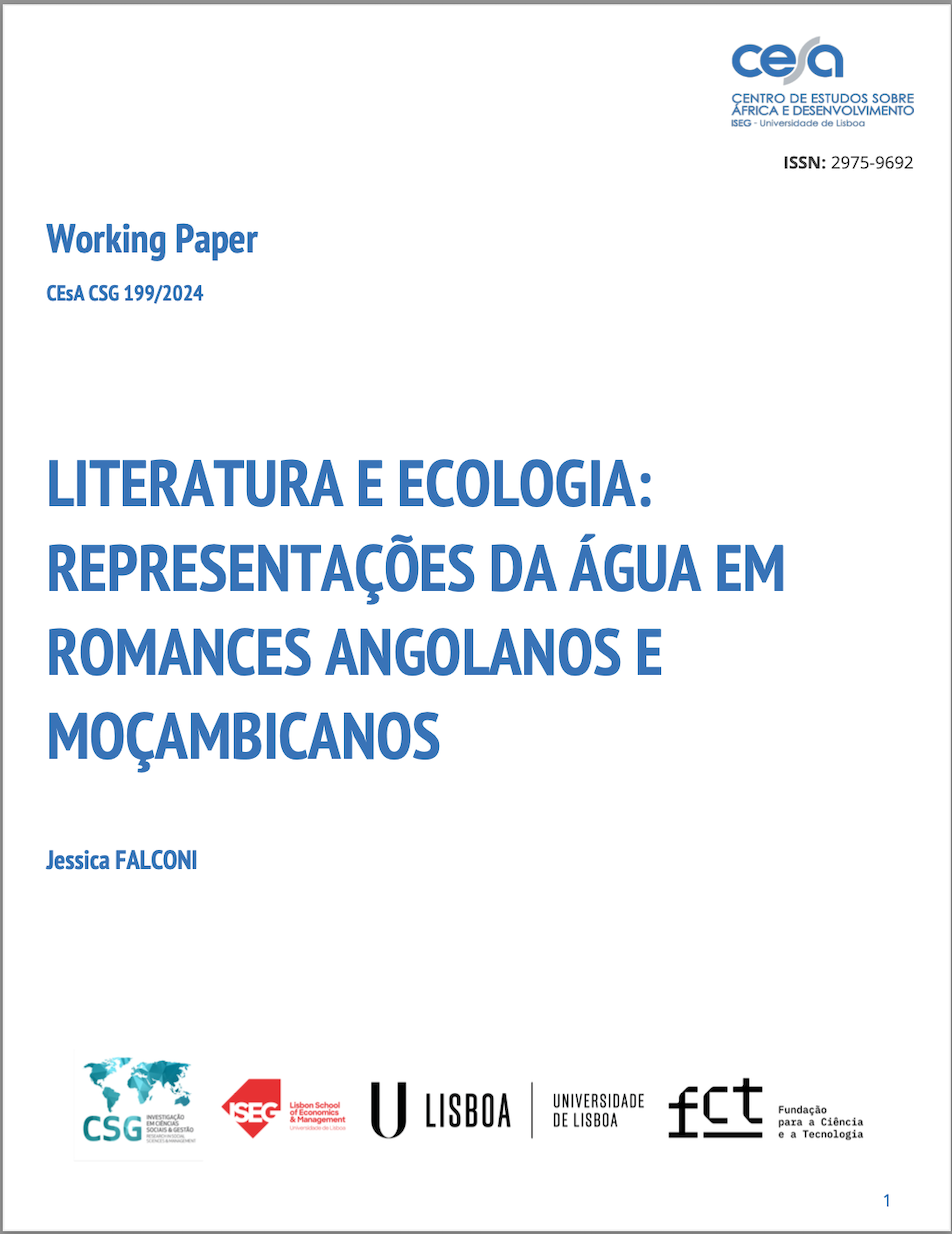
Working Paper 199/2024: Literatura e Ecologia: Representações da água em romances angolanos e moçambicanos
Abstract:
This article offers a brief cartography of the narrative role of water in Angolan and Mozambican literature, through a comparative reading of four novels: O desejo de Kianda (1995) by the Angolan Pepetela; De Rios Velhos e Guerrilheiros. I. O Livro dos Rios (2006) by Luandino Vieira; Água. Uma novela rural (2016) and Ponta Gea (2017) both by the Mozambican João Paulo Borges Coelho.
The introduction places the proposed cartography within the framework of ecocritical studies, whose various paradigms offer useful tools and concepts for reading the selected literary works. The thematic and comparative methodological approach highlights experiences and imaginaries common to two post-colonial contexts, despite the difference in scenarios, themes, aesthetic choices and narrative strategies. The analysis aims to demonstrate that water is a crucial element in narrating post-colonial Angolan and Mozambican societies.
Cite this Working Paper:
Falconi, Jessica (2024). “Literatura e Ecologia: Representações da água em romances angolanos e moçambicanos”. CEsA/CGS – Documentos de trabalho nº 199/2024
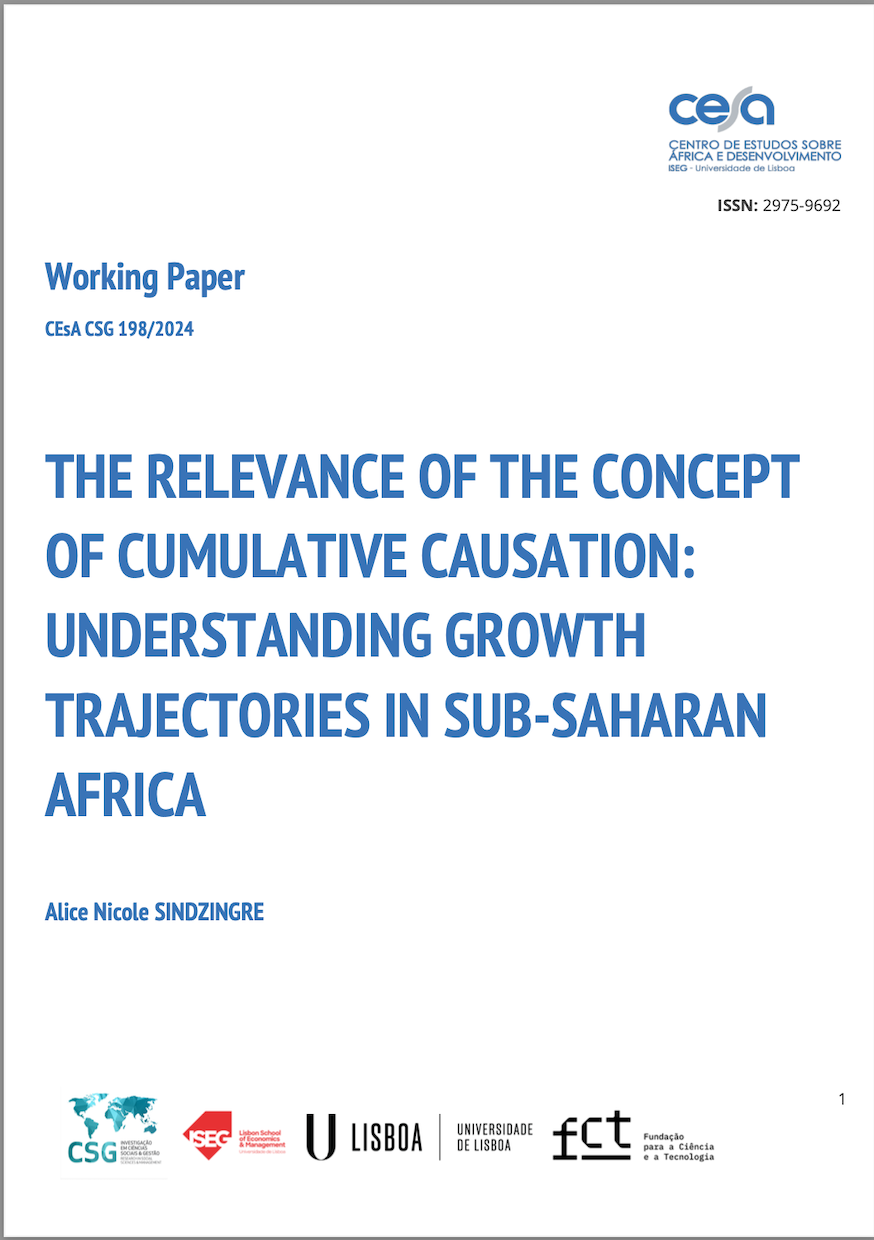
Working Paper 198/2024: The Relevance of the Concept of Cumulative Causation: Understanding growth trajectories in Sub-Saharan Africa
Abstract:
Differences in growth trajectories among countries – including the possibility of divergence -, are a central issue in economics. Mainstream economics explain growth processes via varieties of neoclassical models, even improved with concepts such as institutions. Yet such models have difficulties in providing accurate accounts of the growth trajectories of many developing countries, notably low-income ones. It is argued that the growth paths of low-income countries are more appropriately explained by the theoretical framework that relies on the nexus of concepts of cumulative causation, non-linearities, threshold effects, self-reinforcing processes, irreversibility, path dependence and traps – though this approach remains marginal in mainstream economic analyses of growth and development. Firstly, this nexus of concepts is a powerful framework concerning the possibility and explanation of dynamic divergence regarding growth between countries, as it exhibits properties such as: the possibility of cumulative, dynamically self-reinforcing, processes; the existence of thresholds and tipping points; multiple equilibria. Secondly, cumulative causation, by definition, involves a combination of causes: its conceptual framework allows for the integration of several dimensions – economic, political, social, cognitive -, whose combination results in either virtuous or vicious circles. In developing countries, these causes (and their coalescence) typically consist in economic structures (e.g., commodity-based export markets), political institutions and social norms (predatory regimes, high inequality) as well as types of public policies.
Cite this Working Paper:
Sindzingre, Alice Nicole (2024). “The Relevance of the Concept of Cumulative Causation: Understanding growth trajectories in Sub-Saharan Africa”. CEsA/CGS – Documentos de trabalho nº 198/2024
